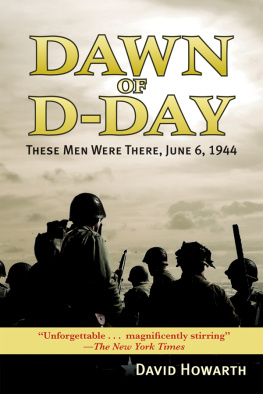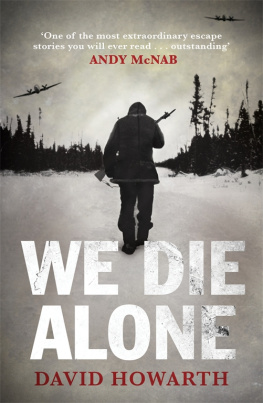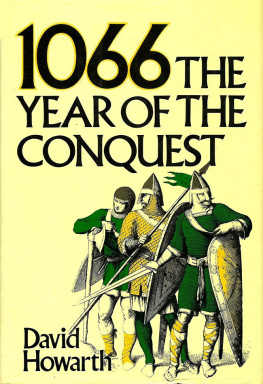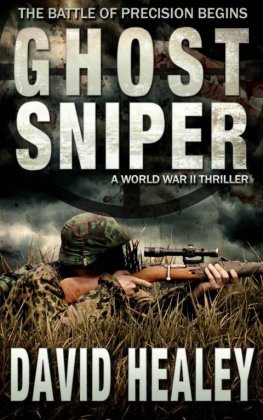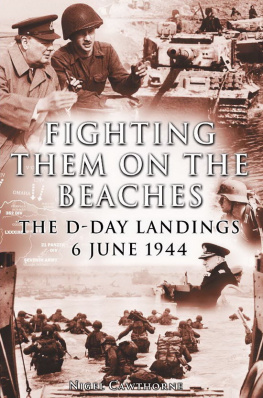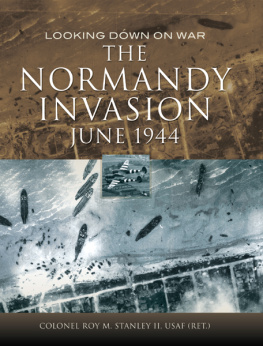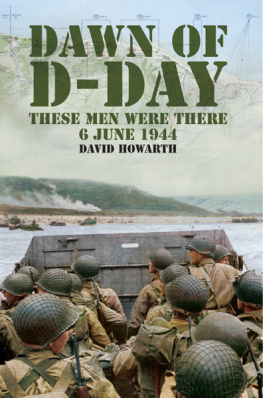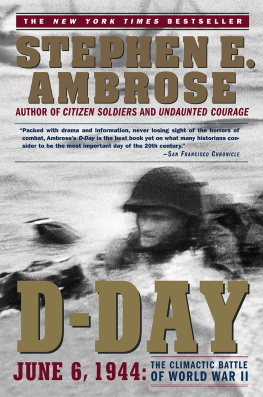David Howarth - Dawn of D-DAY: These Men Were There, June 6, 1944
Here you can read online David Howarth - Dawn of D-DAY: These Men Were There, June 6, 1944 full text of the book (entire story) in english for free. Download pdf and epub, get meaning, cover and reviews about this ebook. year: 2008, publisher: Skyhorse Publishing, genre: Art. Description of the work, (preface) as well as reviews are available. Best literature library LitArk.com created for fans of good reading and offers a wide selection of genres:
Romance novel
Science fiction
Adventure
Detective
Science
History
Home and family
Prose
Art
Politics
Computer
Non-fiction
Religion
Business
Children
Humor
Choose a favorite category and find really read worthwhile books. Enjoy immersion in the world of imagination, feel the emotions of the characters or learn something new for yourself, make an fascinating discovery.
- Book:Dawn of D-DAY: These Men Were There, June 6, 1944
- Author:
- Publisher:Skyhorse Publishing
- Genre:
- Year:2008
- Rating:4 / 5
- Favourites:Add to favourites
- Your mark:
- 80
- 1
- 2
- 3
- 4
- 5
Dawn of D-DAY: These Men Were There, June 6, 1944: summary, description and annotation
We offer to read an annotation, description, summary or preface (depends on what the author of the book "Dawn of D-DAY: These Men Were There, June 6, 1944" wrote himself). If you haven't found the necessary information about the book — write in the comments, we will try to find it.
Dawn of D-DAY: These Men Were There, June 6, 1944 — read online for free the complete book (whole text) full work
Below is the text of the book, divided by pages. System saving the place of the last page read, allows you to conveniently read the book "Dawn of D-DAY: These Men Were There, June 6, 1944" online for free, without having to search again every time where you left off. Put a bookmark, and you can go to the page where you finished reading at any time.
Font size:
Interval:
Bookmark:

Copyright 2008 by David Howarth
All Rights Reserved. No part of this book may be reproduced in any manner without the express written consent of the publisher, except in the case of brief excerpts in critical reviews or articles. All inquiries should be addressed to Skyhorse Publishing, 307 West 36th Street, 11th Floor, New York, NY 10018.
Skyhorse Publishing books may be purchased in bulk at special discounts for sales promotion, corporate gifts, fund-raising, or educational purposes. Special editions can also be created to specifications. For details, contact the Special Sales Department, Skyhorse Publishing, 307 West 36th Street, 11th Floor, New York, NY 10018 or .
Skyhorse and Skyhorse Publishing are registered trademarks of Skyhorse Publishing, Inc., a Delaware corporation.
Visit our website at www.skyhorsepublishing.com
10 9 8 7 6 5 4 3
Library of Congress Cataloging-in-Publication Data is available on file.
ISBN: 978-1-60239-203-8
Printed in the United States of America
When this book was first published in 1959, its subject D-Day, the Allied invasion of Europe on 6 June 1944 was recent history, still very much alive in the memories of all those thousands who took part and survived, and all those many thousands more whose lives were directly affected by it. As a professional writer of history myself, I know well that recent history can be very challenging: it is almost certain that after publication, when it is too late to change matters, a reader will send a letter saying (more or less politely) that the author has got it wrong, and that the reader knows, because he or she was there. So the subtitle of this edition is important: these men were there.
On first publication, Dawn of D-Day was received with acclamation all around the world for precisely the reasons that its author, my father, sets out with typical modesty in his foreword; it is not a military textbook, but an impression, drawn from the direct experiences of about thirty participants, of the greatest tri-service international operation that had ever taken place. A different thirty people might well have provided different impressions, yet had they done so, theirs would be no less valid than this. D-Day was, as the author said, such a vast adventure that no single book could possibly encompass it all. But I should say, on behalf of all those who contributed to it, that this book comes close in a very special way; of all the many volumes I have read about the invasion, Dawn of D-Day best conveys the actual experience of that momentous day, and is a work of brilliance.
I can write these things without fear of being accused of bias, for two reasons. Firstly, many other people reviewers and readers have said them before me. Secondly, after more than twenty years of writing history, I can read the book with a professional eye; and in doing so I remain greatly impressed by the authors ability. Of course it is a personal delight that he was (and though dead, still is) my dear father, and because of that I probably cannot be entirely dispassionate about the book; but he had a really outstanding ability to listen and relate to people whom he interviewed and then to tell their stories woven in with those of many others. From these authentic sources he was able to create for the reader a living narrative filled with clear, well-drawn, understandable individual characters. And even if we were not there, in reading about them we can relate to them, worry about them, fear for their safety, even laugh with them at some ludicrous event in the midst of a terrifying battle. Dawn of D-Day is, in other words, an intensely human record.
Like any sane individual my father found war abhorrent, but in writing this book he had no anti-war message to convey; he was not present at D-Day because he was fighting in a different arena for the same cause. Rather, his interest was in ordinary people undergoing experiences of great stress for differing causes that they believed just and right; and because of those qualities the book is also a work of great value, even now, sixty years after the events it describes.
Following its first publication my father received many letters from readers, French, British, American and German men and women for whom this was not just recent history, but part of their own lives. Two of those letters were particularly notable. One, from an American airman, a navigator, fell into the inevitable category of the author has got it wrong, and that the reader knows, because he or she was there. But it had an unusual twist. The letter-writer was not complaining about the books overall accuracy; instead he was embarrassed to say that from his personal knowledge, a contributory interviewee a fellow American flying officer had not played quite such a part as was told. The other letter came from a Frenchman, and is notable as being much more typical of the rest. Writing for himself and his wife, he said, We could only think that the Liberation would bring to us the liberated more dead! Your work, on the other hand, offers real historic sincerity, because if in ten or fifteen years from now, someone wishes to reconstruct and remember the story of that day, the historian will search for the privileged people who took part, and will only find your book, or the dead. Once again, thank you. My wife and my children join me in this.
So do my wife and children, and this is the power of Dawn of D-Day , a complex story told with wonderful simplicity. Born in 1953, I have no recollection of this book being researched and written, nor of course any direct knowledge of the action described; but today we may walk in peace along beaches that were the battlefront. Here and there stand memorials, and not far off in Caen is one of the worlds most moving museums, the Memorial a museum for peace. Thank goodness that the Allied forces prevailed; we are their indebted beneficiaries. When the wind blows on the beaches the sand stings your legs and you may look out over the sea and imagine it filled with Allied warships. You may also imagine the shock of the ordinary German soldiers, tasked with defending those beaches, when they awoke to such a sight; and in this book you may read what D-Day meant for ordinary people on both sides.
Stephen Howarth, 2004
T HIS IS not a military text-book. Military histories of battles deal with military units, and the way their generals manuvred them; they do not usually tell their readers what individual soldiers saw or did, or what they thought or feared. But this is the aspect of battles which interests me: not only the actions and opinions of the generals who planned them, but also those of the soldiers and junior officers who had to fight them.
There are several technical works already about the invasion of Normandy, and several generals memoirs; and there is Chester Wilmots brilliant analysis in The Struggle for Europe . What I have tried to do is simply to give an impression of the experience of the men who landed in the night and dawn of D Day: an impression of what it was like to be dropped from the sky that morning, or pitched ashore from a landing craft under fire.
This is a simple intention, but it can only be carried out with limitations. Churchill himself said the invasion of Normandy was the most complicated and difficult operation that has ever taken place. Tens of thousands of men took part in even its earliest stages. One can only give an impression of such a vast sum of activity by choosing the experiences of a few men as examples of the rest. However many one chose, they could only be a small proportion of the whole; and I think that to choose too many would make the story dull and repetitious. Therefore I have only chosen just over thirty; but I have chosen them carefully, to make the impression as balanced as I can.
Font size:
Interval:
Bookmark:
Similar books «Dawn of D-DAY: These Men Were There, June 6, 1944»
Look at similar books to Dawn of D-DAY: These Men Were There, June 6, 1944. We have selected literature similar in name and meaning in the hope of providing readers with more options to find new, interesting, not yet read works.
Discussion, reviews of the book Dawn of D-DAY: These Men Were There, June 6, 1944 and just readers' own opinions. Leave your comments, write what you think about the work, its meaning or the main characters. Specify what exactly you liked and what you didn't like, and why you think so.

